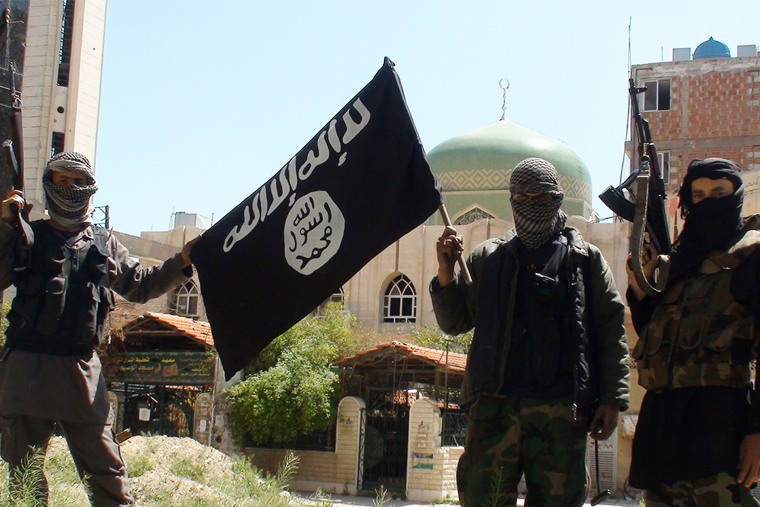In the wake of horrific terrorist attacks in Paris, public attention has been squarely refocused on the Islamic State, or ISIS, a jihadist terrorist network that controls large swaths of territory across Jordan, Lebanon, Syria, and parts of Iraq. ISIS is the only group that has thus far claimed responsibility for the attacks in Paris, boasting of how the French have been “shocked and awed.” According to a statement from ISIS, “France and other nations following its path know that they will continue to be at the top of the target list.”
Here are answers to the most searched-for questions on ISIS, according to Google News Lab — everything from what we know about the deadly terrorist group and what it stands for to where it comes from and why it's trying to establish a self-proclaimed caliphate in the Middle East.
What does ISIS stand for?

The acronym ISIS stands for “the Islamic State of Iraq and Syria (al-Sham).” It is also commonly known as “the Islamic State of Iraq and the Levant” (ISIL), an acronym favored by the White House, and other times by the pejorative term “Daesh”—although ISIS has insisted that heretofore it should only be referred to as “the Islamic State.”
What is ISIS?
The roots of ISIS can be traced in part to the U.S. invasion of Iraq in 2003 and the subsequent emergence of al-Qaeda in Iraq (AQI), founded by Jordanian national Abu Musab al-Zarqawi. Although Zarqawi had spent time at jihadi training camps in Afghanistan during the 1990s, he was distant from the leadership of al-Qaeda and initially attempted to create his own separate organization. Given his personal network of Jordanian, Syrian, Palestinian, Lebanese, and Iraqi jihadists, the war in Iraq provided Zarqawi a unique opportunity to take charge of hardline Islamist fighters opposed to the U.S. occupation. The primary purpose of Zarqawi’s organization was to remove the foreign occupation of Iraq, overthrow the nascent democratic government, and replace it with a radical Sunni Islamist regime run by al-Qaeda. AQI gained a particular reputation for their video-recorded hostage beheadings and their routine use of suicide bombers to strike soft targets.
RELATED: Where will ISIS strike next?
In an apparent effort to address criticism that the group was too focused on recruiting foreign fighters, following the death of Zarqawi in a U.S. airstrike, the group declared the official formation of an “Islamic State of Iraq.” It was finally under the leadership of native Iraqis, including several who had held prior roles in the regime of Saddam Hussein. Five years later, when neighboring Syria descended into a bloody sectarian civil war, the Islamic State quietly dispatched several top members to Sunni regions in Syria in order to form a local chapter inside the country under the name “Jabhat al-Nusra.”
In April 2013, current ISIS leader Abu Bakr al-Baghdadi abruptly declared that Jabhat al-Nusra had secretly been an ISIS project all along and “now it is time to declare … the cancellation of the name ‘Islamic State of Iraq’ and the cancellation of the name ‘Jabhat al-Nusra’, and instead gathering them under a single name, the ‘Islamic State of Iraq and the Levant.’”
The newly rebranded ISIS network began aggressively expanding outward from the Iraqi-Syria border regions, seizing control of vast areas of territory in both countries, including the cities of Raqqa, Mosul, and Fallujah. Facing continued pressure from multiple sides, many smaller jihadi groups active inside both Syria and Iraq gradually coalesced under the banner of ISIS. Anyone who refused to join ISIS became a target—including even the leaders of its former offshoot in Syria, Jabhat al-Nusra. Instead of following al-Baghdadi, the al-Nusra leaders rejected his orders to merge with ISIS and vowed their complete loyalty to al-Qaeda and its leader, Dr. Ayman al-Zawahiri. Over the past two years, ISIS has equally targeted innocent civilians, the Syrian government, Kurdish militias, Western journalists and aid workers, and even their own fellow jihadists.
What does ISIS want?
According to a 2008 propaganda video released by the group, the purpose of ISIS is to serve as a “dagger in the American-Jewish plan for the region … The establishment of the Islamic State … is the gate through which the conquest of Jerusalem will be achieved and the filth of the Jewish thieves will be removed from the heart of the Islamic world.” The grander vision for ISIS in founding such an Islamic State is to enforce an extreme, puritanical interpretation of Islamic law under a religiously-ordained regime. ISIS has specifically rejected democracy as a deviant Western ideology and has insisted that, because America and its allies would never accept the existence of such an “Islamic State”, “no Muslim can wish for the state of Islam to be established other than on top of skulls, savagery, and pure blood.”
ISIS has repeatedly maintained that its fight is not limited merely to Syria and Iraq; rather, “our battle is one in Iraq, Al-Sham, Yemen, and the rest of the Arabian Peninsula and Khorasan, and there is no difference between one location and other.” This is why the group now stubbornly insists on being called “the Islamic State” instead of “ISIS.” As a part of its globalist, revolutionary methodology, ISIS eagerly welcomes new recruits and adherents from around the world. According to al-Baghdadi, its top leader, the Islamic State is "a state where the Arab and non-Arab, the white man and black man, the easterner and westerner are all brothers. It is a khilafah [Islamic empire] that has gathered together the Caucasian, Indian, Chinese, Shami, Iraqi, Yemeni, Egyptian, Maghribi (North African), American, French, German, and Australian.” By aggressively recruiting Westerners, ISIS also creates a surplus of potential “sleeper” operatives able to be employed in terrorist plots targeting countries in Europe and North America.
Evan Kohlmann is an NBC News analyst and Chief of Research and Development at Flashpoint, a New York-based cyber intelligence firm focused on threat actors in the Deep and Dark Web.